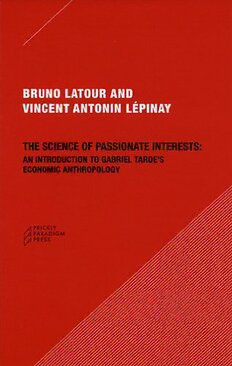Download The Science of Passionate Interests: An Introduction to Gabriel Tarde's Economic Anthropology PDF Free - Full Version
Download The Science of Passionate Interests: An Introduction to Gabriel Tarde's Economic Anthropology by Bruno Latour, Vincent Antonin Lepinay in PDF format completely FREE. No registration required, no payment needed. Get instant access to this valuable resource on PDFdrive.to!
About The Science of Passionate Interests: An Introduction to Gabriel Tarde's Economic Anthropology
How can economics become genuinely quantitative? This is the question that French sociologist Gabriel Tarde tackled at the end of his career, and in this pamphlet, Bruno Latour and Vincent Antonin L?pinay offer a lively introduction to the work of the forgotten genius of nineteenth-century social thought. Tarde’s solution was in total contradiction to the dominant views of his time: to quantify the connections between people and goods, you need to grasp “passionate interests.” In Tarde’s view, capitalism is not a system of cold calculations—rather it is a constant amplification in the intensity and reach of passions. In a stunning anticipation of contemporary economic anthropology, Tarde’s work defines an alternative path beyond the two illusions responsible for so much modern misery: the adepts of the Invisible Hand and the devotees of the Visible Hand will learn how to escape the sterility of their fight and recognize the originality of a thinker for whom everything is intersubjective, hence quantifiable. At a time when the regulation of financial markets is the subject of heated debate, Latour and L?pinay provide a valuable historical perspective on the fundamental nature of capitalism.
Detailed Information
| Author: | Bruno Latour, Vincent Antonin Lepinay |
|---|---|
| Publication Year: | 2010 |
| ISBN: | 9780979405778 |
| Pages: | 87 |
| Language: | English |
| File Size: | 1.744 |
| Format: | |
| Price: | FREE |
Safe & Secure Download - No registration required
Why Choose PDFdrive for Your Free The Science of Passionate Interests: An Introduction to Gabriel Tarde's Economic Anthropology Download?
- 100% Free: No hidden fees or subscriptions required for one book every day.
- No Registration: Immediate access is available without creating accounts for one book every day.
- Safe and Secure: Clean downloads without malware or viruses
- Multiple Formats: PDF, MOBI, Mpub,... optimized for all devices
- Educational Resource: Supporting knowledge sharing and learning
Frequently Asked Questions
Is it really free to download The Science of Passionate Interests: An Introduction to Gabriel Tarde's Economic Anthropology PDF?
Yes, on https://PDFdrive.to you can download The Science of Passionate Interests: An Introduction to Gabriel Tarde's Economic Anthropology by Bruno Latour, Vincent Antonin Lepinay completely free. We don't require any payment, subscription, or registration to access this PDF file. For 3 books every day.
How can I read The Science of Passionate Interests: An Introduction to Gabriel Tarde's Economic Anthropology on my mobile device?
After downloading The Science of Passionate Interests: An Introduction to Gabriel Tarde's Economic Anthropology PDF, you can open it with any PDF reader app on your phone or tablet. We recommend using Adobe Acrobat Reader, Apple Books, or Google Play Books for the best reading experience.
Is this the full version of The Science of Passionate Interests: An Introduction to Gabriel Tarde's Economic Anthropology?
Yes, this is the complete PDF version of The Science of Passionate Interests: An Introduction to Gabriel Tarde's Economic Anthropology by Bruno Latour, Vincent Antonin Lepinay. You will be able to read the entire content as in the printed version without missing any pages.
Is it legal to download The Science of Passionate Interests: An Introduction to Gabriel Tarde's Economic Anthropology PDF for free?
https://PDFdrive.to provides links to free educational resources available online. We do not store any files on our servers. Please be aware of copyright laws in your country before downloading.
The materials shared are intended for research, educational, and personal use in accordance with fair use principles.

